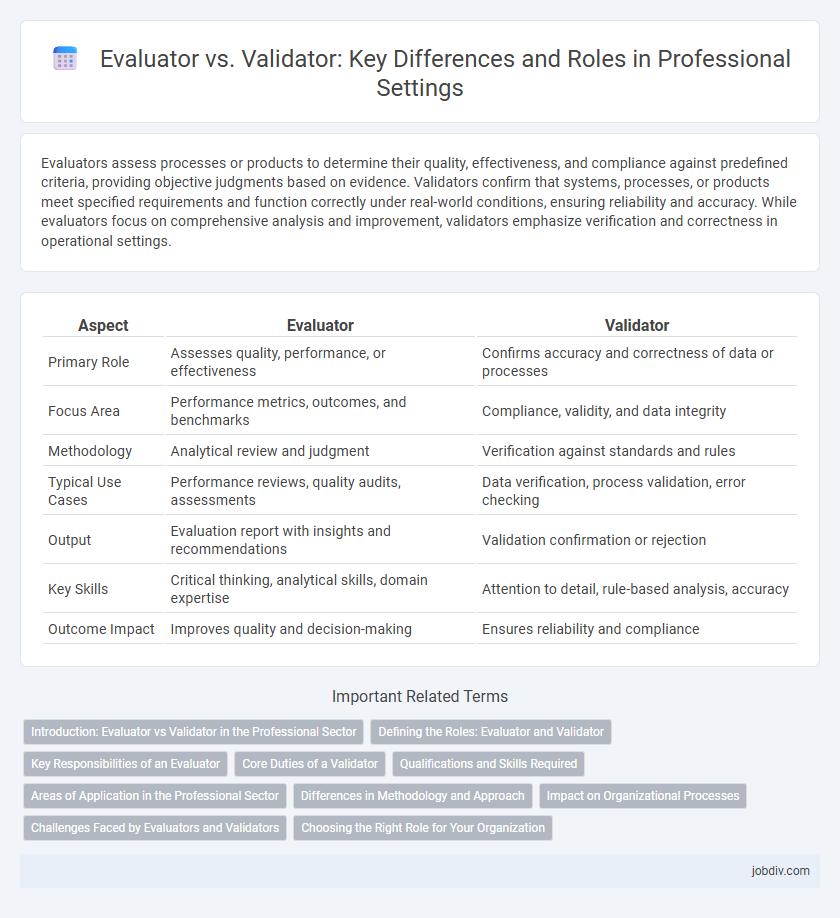Evaluators assess processes or products to determine their quality, effectiveness, and compliance against predefined criteria, providing objective judgments based on evidence. Validators confirm that systems, processes, or products meet specified requirements and function correctly under real-world conditions, ensuring reliability and accuracy. While evaluators focus on comprehensive analysis and improvement, validators emphasize verification and correctness in operational settings.
Table of Comparison
| Aspect | Evaluator | Validator |
|---|---|---|
| Primary Role | Assesses quality, performance, or effectiveness | Confirms accuracy and correctness of data or processes |
| Focus Area | Performance metrics, outcomes, and benchmarks | Compliance, validity, and data integrity |
| Methodology | Analytical review and judgment | Verification against standards and rules |
| Typical Use Cases | Performance reviews, quality audits, assessments | Data verification, process validation, error checking |
| Output | Evaluation report with insights and recommendations | Validation confirmation or rejection |
| Key Skills | Critical thinking, analytical skills, domain expertise | Attention to detail, rule-based analysis, accuracy |
| Outcome Impact | Improves quality and decision-making | Ensures reliability and compliance |
Introduction: Evaluator vs Validator in the Professional Sector
Evaluators systematically assess project outcomes against predefined criteria to determine effectiveness and impact within professional settings. Validators verify the accuracy and reliability of these assessments, ensuring compliance with industry standards and organizational requirements. Both roles collaborate to enhance decision-making and quality assurance in business processes.
Defining the Roles: Evaluator and Validator
The Evaluator systematically assesses the performance, accuracy, and effectiveness of a system or process by analyzing data against predefined criteria. The Validator ensures that the system meets all specified requirements and standards, verifying compliance through rigorous testing and validation procedures. Both roles are critical in quality assurance, with the Evaluator focusing on assessment while the Validator concentrates on confirmation and adherence to standards.
Key Responsibilities of an Evaluator
Evaluators analyze project outcomes, measure performance against established criteria, and provide data-driven insights to inform decision-making and improve effectiveness. Their key responsibilities include designing assessment frameworks, conducting qualitative and quantitative research, and interpreting results to ensure alignment with organizational goals. Evaluators also prepare comprehensive reports that guide stakeholders in optimizing strategies and resource allocation.
Core Duties of a Validator
Validators ensure the accuracy and integrity of data by systematically verifying information against established standards and criteria. Core duties include confirming compliance with regulatory requirements, validating data inputs for consistency, and conducting thorough audits to detect and resolve discrepancies. This rigorous validation process supports decision-making and maintains organizational trust in data quality.
Qualifications and Skills Required
Evaluators require advanced analytical skills and extensive knowledge in research methodologies to critically assess project outcomes and data integrity. Validators must possess technical expertise in standards compliance, process auditing, and quality assurance to verify that products or systems meet specified criteria. Both roles demand strong problem-solving abilities, attention to detail, and effective communication skills to ensure accurate and reliable assessments within professional environments.
Areas of Application in the Professional Sector
Evaluators are primarily deployed in project management, quality assurance, and performance review processes to assess outcomes against predefined criteria, ensuring strategic alignment and operational effectiveness. Validators are crucial in software development, compliance auditing, and data integrity checks, confirming that systems and processes meet regulatory standards and functional specifications. Both roles enhance decision-making in sectors such as healthcare, finance, and engineering by providing rigorous verification and assessment to mitigate risks and optimize performance.
Differences in Methodology and Approach
Evaluators assess programs or products by systematically collecting and analyzing data to measure effectiveness against predefined criteria, often using qualitative and quantitative research methods. Validators primarily focus on confirming the accuracy and reliability of specific outputs or components through testing, verification, and validation procedures to ensure compliance with standards. The methodology of evaluators is broader and interpretive, while validators employ precise, rule-based approaches targeting conformance and correctness.
Impact on Organizational Processes
Evaluators assess organizational processes to identify efficiency gaps and compliance issues, driving data-informed improvements that enhance overall performance. Validators ensure that implemented changes align with predefined standards and regulatory requirements, minimizing risks and maintaining quality assurance. The combined function of evaluators and validators ensures continuous process optimization and regulatory adherence, fostering sustainable organizational growth.
Challenges Faced by Evaluators and Validators
Evaluators encounter challenges related to ensuring the accuracy and consistency of assessment criteria while managing diverse data sources and subjective interpretations. Validators face difficulties in verifying data integrity and compliance with standards amid evolving regulatory requirements and complex validation protocols. Both roles require adapting to technological advancements and integrating automated tools without compromising thoroughness and reliability.
Choosing the Right Role for Your Organization
Choosing between an evaluator and a validator depends on your organization's specific needs for quality assurance and compliance verification. Evaluators assess processes and outcomes to identify areas for improvement, while validators confirm that products or systems meet established standards and regulatory requirements. Aligning the role with your organizational goals ensures effective resource allocation and enhanced operational efficiency.
Evaluator vs Validator Infographic

 jobdiv.com
jobdiv.com